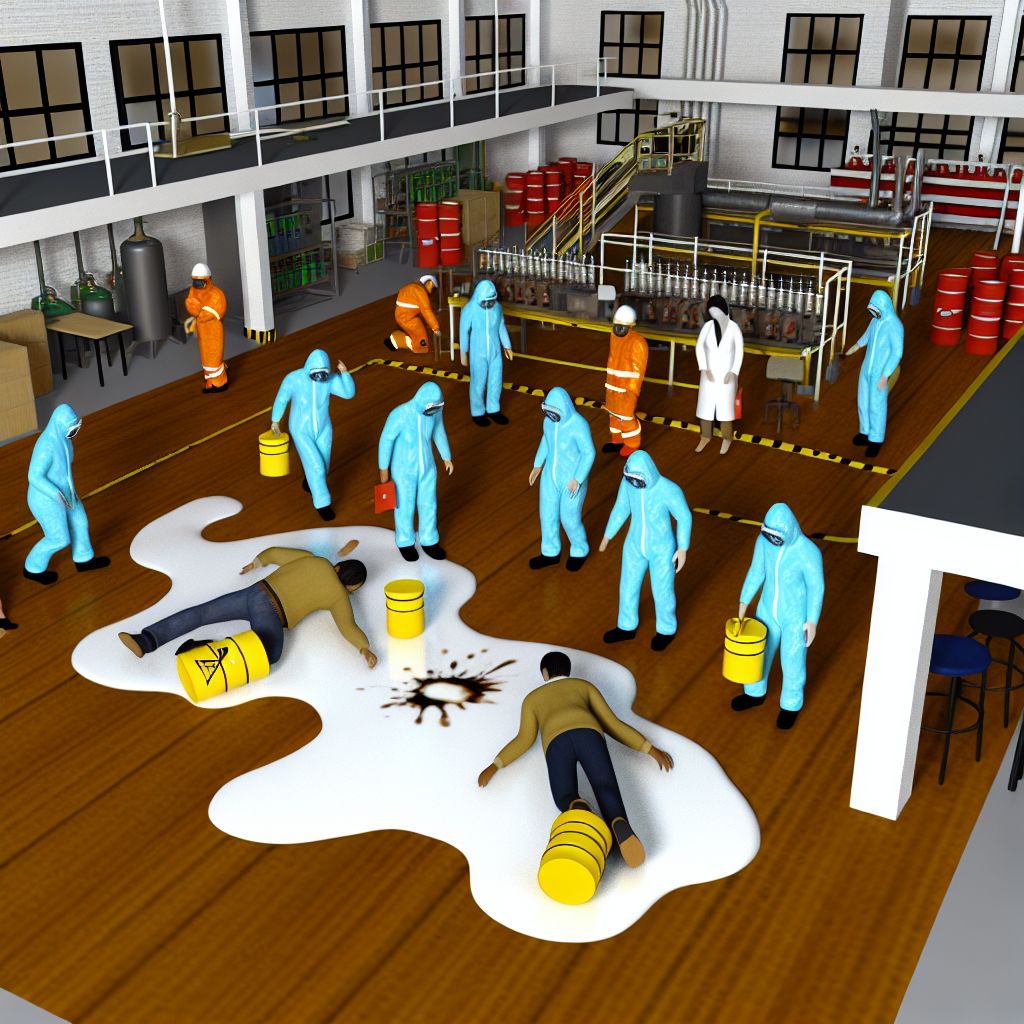Deutsch: Chemieunfall / Español: Derrame químico / Português: Derramamento químico / Français: Déversement chimique / Italiano: Sversamento chimico
Chemical spill in the environmental context refers to the release of harmful chemicals into the environment, which can occur on land, in the air, or in water bodies. These spills can result from industrial accidents, transportation mishaps, or as a consequence of natural disasters that disrupt chemical storage facilities. The release of hazardous chemicals poses significant risks to the environment and public health, contaminating water sources, soil, and air, and affecting both wildlife and human communities.
Description

Chemical spills can involve a wide range of substances, including petroleum products, acids, bases, solvents, and toxic metals, each with different potential impacts on the environment. The severity and type of environmental damage caused by a chemical spill depend on various factors, including the nature of the chemical, the quantity released, the location of the spill, and the effectiveness of the immediate response.
Immediate effects might include the death of wildlife, contamination of drinking water supplies, and damage to ecosystems, while long-term impacts can include persistent soil and water contamination, disruption of reproductive systems in animals, and health issues in humans such as cancers and neurological disorders.
Application Areas
- Emergency Response: Rapid containment, cleanup, and mitigation efforts to minimize environmental and health impacts.
- Environmental Monitoring and Remediation: Assessing the extent of contamination and implementing strategies to remediate affected environments.
- Regulation and Prevention: Developing policies and practices to prevent future spills and reduce their potential impacts.
Well-Known Examples
- The Exxon Valdez Oil Spill (1989): One of the most infamous environmental disasters, where a tanker spilled millions of gallons of crude oil into Alaska's Prince William Sound, causing extensive environmental damage.
- Bhopal Gas Tragedy (1984): A gas leak in Bhopal, India, released tons of toxic gases into the air, leading to thousands of deaths and long-term health effects for the local population.
Treatment and Risks
The management of chemical spills involves immediate and long-term strategies. Initial responses typically include containing the spill to prevent further spread, collecting and removing the spilled material, and neutralizing or detoxifying the contaminants. Long-term efforts focus on environmental restoration and monitoring, health screenings for affected populations, and analyzing the incident to improve spill prevention and response strategies in the future.
The risks associated with chemical spills are multifaceted, affecting not only ecological health and biodiversity but also the well-being of human communities, particularly those in vulnerable or proximate areas. The economic costs can also be significant, encompassing cleanup efforts, legal liabilities, and lost revenue for affected industries.
Similar Terms or Synonyms
- Hazardous material release
- Toxic spill
- Environmental contamination
Summary
A chemical spill represents a significant environmental hazard, resulting from the unintended release of harmful chemicals into the environment. The impacts of such spills are wide-ranging, affecting wildlife, human health, and the integrity of ecosystems. Effective management requires a combination of rapid response, long-term remediation efforts, and preventive measures to mitigate the risks associated with chemical spills and safeguard the environment for future generations.
--
Related articles to the term 'Chemical spill' | |
| 'Acid' at Quality-database.eu | ■■■■■■■■■■ |
| Acid refers to a chemical solution with an pH less than 7. ACID is a term in the database context. . . . Read More | |
| 'Consequence' | ■■■■■■■■■■ |
| Consequence in the environmental context refers to the outcomes or effects resulting from natural or . . . Read More | |
| 'Accident' at psychology-lexicon.com | ■■■■■■■■ |
| Accident refers to unintentional Injury. In psychology, the term "accident" can refer to an unexpected . . . Read More | |
| 'Accident Site' | ■■■■■■■ |
| An Accident Site is the location of an unexpected occurrence, failure or loss, either at a Plant or along . . . Read More | |
| 'Spill' | ■■■■■■■ |
| Spill in the environmental context refers to the unintentional release of substances—such as oil, chemicals, . . . Read More | |
| 'Sanitation' | ■■■■■■■ |
| Sanitation in the environmental context refers to the systems and practices put in place to manage human . . . Read More | |
| 'Danger' at top500.de | ■■■■■■■ |
| Danger in the industrial context refers to any Condition, substance, or activity that has the potential . . . Read More | |
| 'Stabilization' | ■■■■■■ |
| Stabilization in the environmental context refers to the processes and methods used to prevent or reduce . . . Read More | |
| 'Moisture' at travel-glossary.com | ■■■■■■ |
| Moisture in the travel context refers to the presence of water or humidity in the environment, which . . . Read More | |
| 'Detoxification' | ■■■■■■ |
| Deutsch: Entgiftung / Español: Desintoxicación / Português: Desintoxicação / Français: Détoxification . . . Read More | |
